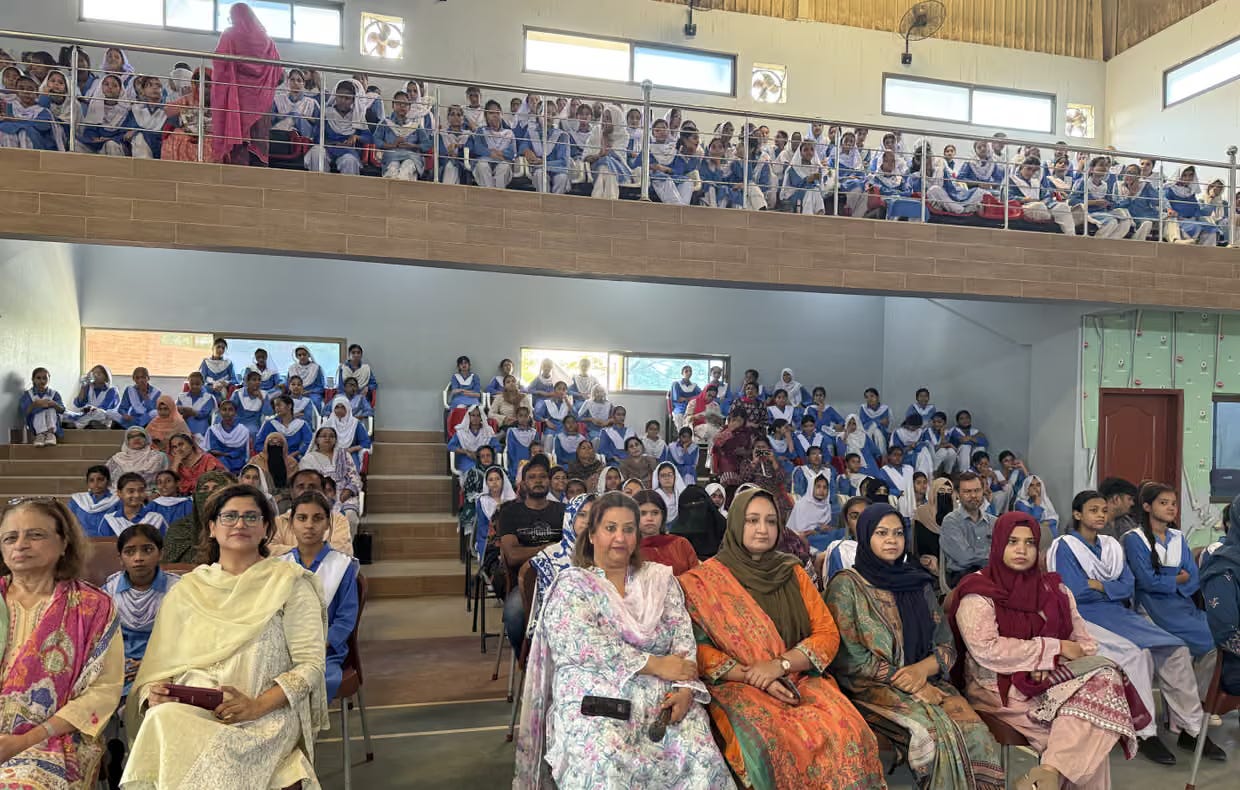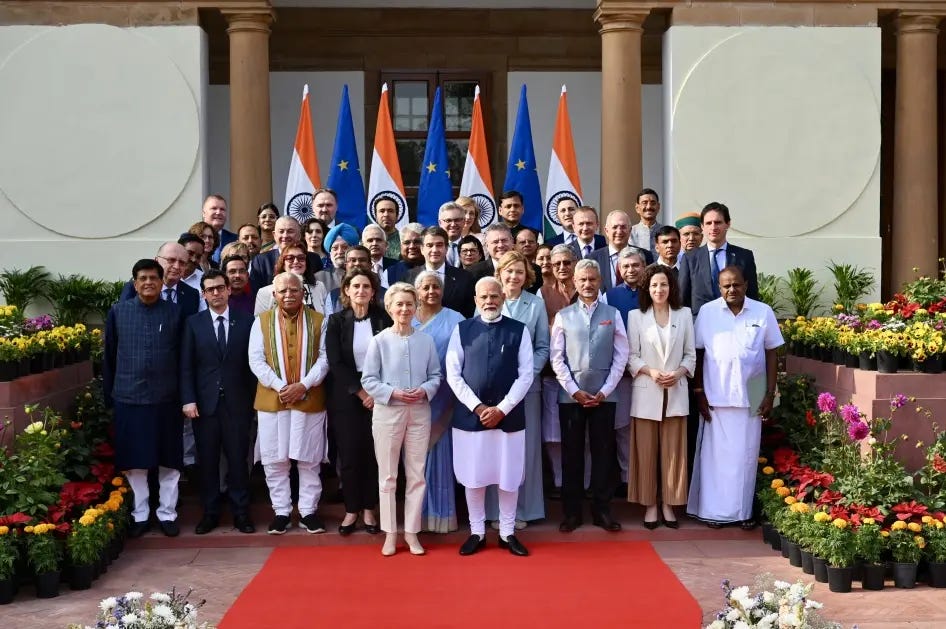Developmental Insights Edition 19
In Discussion: A summary of the United Nations Report titled, Progress on the Sustainable Development Goals: The Gender Snapshot 2025
Welcome to the 19th edition of Developmental Insights! In this edition, we head to Pakistan as the country rolls out vaccines for millions of girls and across the EU, who have partnered with India’s government. We also look at the impact that military funding has had on Africa’s climate finance, vulture poisonings in Southern Africa before finishing in Nepal and the protests that erupted nationwide.
For this week’s ‘In Discussion’, we will look at the United Nations report which discusses gender progress on the Sustainable Development Goals (SDGs).
In this edition:
Pakistan begins roll out of HPV vaccine to millions of girls
A nationwide rollout of the human papillomavirus (HPV) has begun in Pakistan. In this first stage, more than 13 million girls between the ages of 9 and 14 are due to receive the vaccine in an initiative aimed at protecting them from cervical cancer. This disease kills more than 3000 women in Pakistan each year.
With questions about fertility being the most popular concern about the vaccine, healthcare officials are hopeful that the free vaccine will both save lives and help break the silence that surrounds the disease. Unfortunately, nearly 50% of girls from the target age group do not attend schools so temporary vaccination centres have been set up in neighbourhoods to ensure that they all receive the vaccine.
The EU’s New India Strategy overlooks Modi’s Repression
Last week, the European Union unveiled the ‘New Strategic EU-India Agenda’ with the objective of bringing both places closer for bilateral cooperation. The document views India as the world’s largest democracy, however, it overlooks the human rights crisis within the country. This includes but is not limited to violence and discrimination against ethnic minorities, caste based discrimination, issues related to freedom of expression, surveillance, and regional conflict and violence.
The European Parliament and human rights groups have raised concerns about the EU’s silence repeatedly yet the EU has continued to interact with Indian Prime Minister Narendra Modi positively. Several governments within the EU such as France, Germany and Italy also support this approach due to the lucrative business deals that may be offered.
Military spending takes up Africa’s Climate Finance Budget
The genocide in Gaza and the conflict in Ukraine has pushed military expenditure to USD $2.7 trillion. Global military spending is now at its highest since the Cold War with African leaders warning that this is reducing the amount of aid that is available to help their countries adapt to the climate crisis. At the second African Climate Summit (ACS) in Ethiopia last week, heads of state, researchers and activists across the continent made a plea to help with climate induced emergencies.
Africa is the continent most impacted by climate change, despite contributing less than 10% to global carbon emissions. The Summit announced a second phase of its adaptation programme, calling international partners to help reach the USD $50 billion goal to expand efforts to cope with climate change. Nevertheless, as humanitarian emergencies continue to develop, there is a competition for where funding should be there or towards fighting the climate crisis.
Mass vulture poisonings expose the need for cross border action in Southern Africa
A bunch of mass vulture poisonings earlier this year has drawn attention to an alarming and ongoing problem in the Greater Limpopo Transfrontier Conservation Area, which sits across Mozambique, South Africa and Zimbabwe. In the past year, more than 2,400 vultures have died from poisoning in this park, directing attention to how they can be protected. Other animals such as hyenas, leopards and lions have also been poisoned.
Experts state that the most urgent need in countering this issue is to increase capacity, resources and collaboration. Although this was expensive, a field response in Kruger National Park (South Africa), which involved teams of veterinarians, rapid response teams and monitoring, saved the lives of more than 80 cultures. Important short term actions include increasing enforcement and tackling corruption.
Deadly Gen Z protests expose decades of systemic rot in Nepal
On the 4th of September, the government of Nepal imposed a ban on social media, which caused protests to erupt nationwide. This, coupled with a broader frustration of deep rooted corruption, nepotism and lack of opportunity led to widespread frustration amongst the nation’s youth. Unemployment in Nepal is at around 20.8% and many young people see government jobs that have been handed out as having politically connected agendas. Overall, the protests demanded political accountability, including the resignation of Prime Minister Khadga Prasad Oli and the establishment of an independent anti-corruption watchdog.
The crisis revealed more than just deep rooted frustration - it also brought decades of institutional fragility to awareness. Political instability has been constant since the end of the civil war in 2006 with frequent changes of government, weak accountability mechanisms and continuous corruption. Most of the protests have been leaderless and organic, illustrating how disconnected youth feel from political structures.
In Discussion:
The United Nations Report titled Progress on the Sustainable Development Goals: The Gender Snapshot 2025
This month, UN Women and the United Nations Department of Economic and Social Affairs published Progress on the Sustainable Development Goals: The Gender Snapshot 2025, an annual report spotlighting the latest data and evidence on gender equality.
The report brought awareness to the fact that if current trends continue, the world will reach 2030 with 351 million women and girls still living in extreme poverty. However, if certain areas are invested into, such as the gender digital divide, then 343.5 million women and girls globally could benefit with 30 million lifted out of poverty by 2050 and generating USD $1 trillion in global GDP by 2030.
Some key findings from the report include:
Only 38 countries have made 18 the minimum age for marriage, while only 63 countries had laws on rape that were based on a lack of consent.
Women perform 2.5 times as many hours of unpaid domestic and care work as men.
Over 230 million women and girls have undergone female genital mutilation.
Only 56.3% of women aged between 15 and 49 who are married or in a union have full decision making power over their sexual and reproductive health and rights.
260,000 women died during pregnancy and childbirth in 2023.
Only 65% of women globally between the ages of 15 and 49 years old met the minimum dietary diversity set by the World Food Organisation.
The report also brought together some of the advancements that have occurred within gender equality:
Between 2019 and 2024, 99 positive legal reforms were implemented to remove discriminatory laws and establish gender equality frameworks.
As of the 1st of January 2025, women held 27.2% of seats in national parliaments, up from 22.3% in 2015.
Younger cohorts of those in parliament represent a more balanced gender ratio:
43% of under 30 members of parliament are women
37% of under 40 members of parliament are women
From 2015 to 2023, female representation in management positions increased by 2.4 percentage points, reaching 30%.
The Progress on the Sustainable Development Goals: The Gender Snapshot 2025 makes it evident that progress is being made towards gender equality. This can be seen through legal reforms, increased political participation and gradual improvements in leadership roles. Nevertheless, there are still profound inequalities which continue to undermine the lives and opportunities for millions of women and girls worldwide. Overall, the report emphasises that without urgent and targeted investments in areas such as digital inclusion, legal protections, health and nutrition to name but a few, the world is falling short of fully achieving the Sustainable Development Goals.
Other Useful Links:
Key Findings from the Report
Key Messages from the Report
As always, thanks for reading edition 19 of Developmental Insights - I hope you enjoyed it and found it informative! Please subscribe to the newsletter if you would like to continue receiving it straight to your inbox every other Friday!
I am always open to suggestions or feedback so please send anything to developmentalinsights@gmail.com or, simply add a comment below!
I look forward to connecting with you further in future editions!
Best,
Harkiran








Thank you for this excellent report